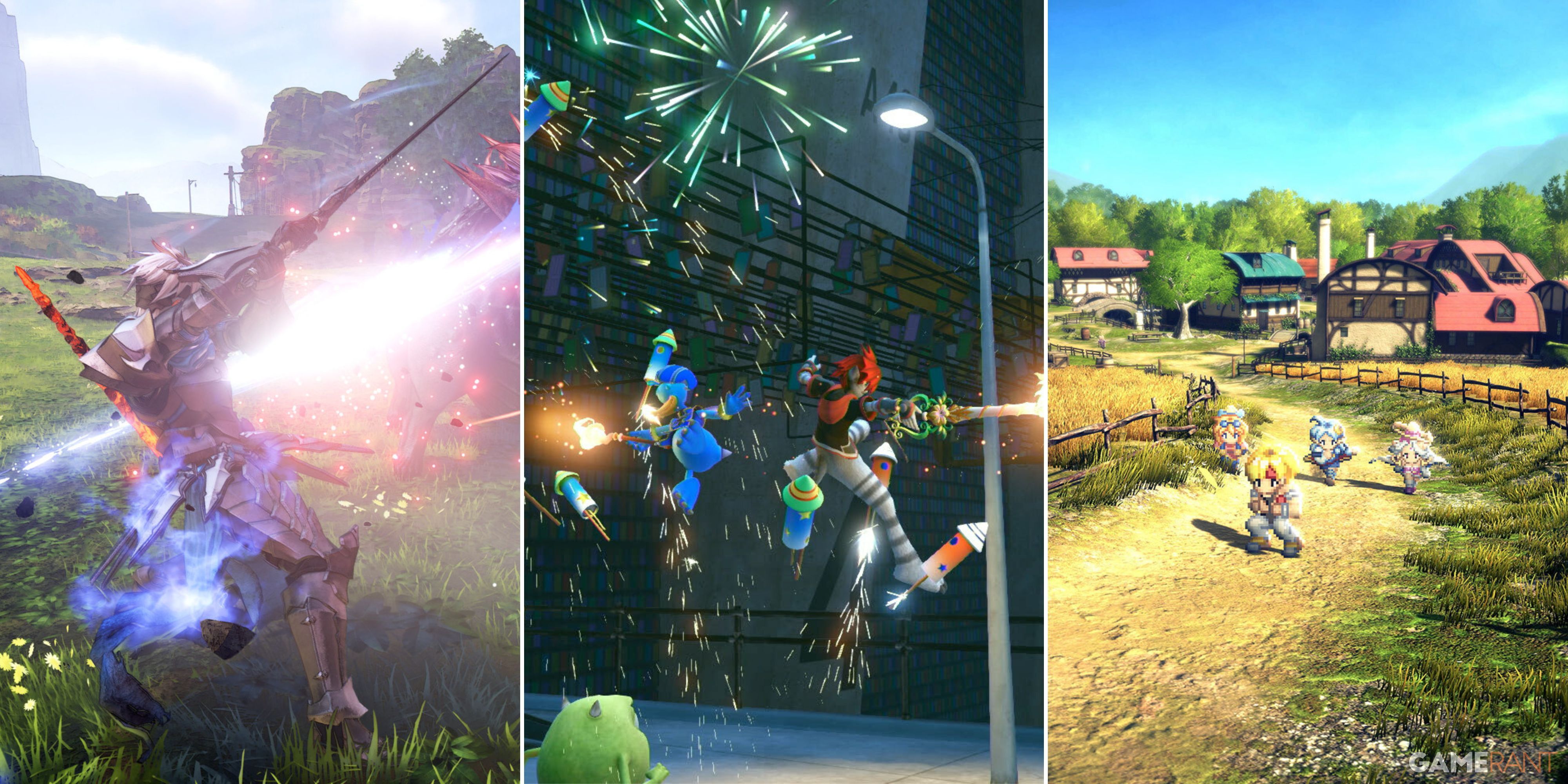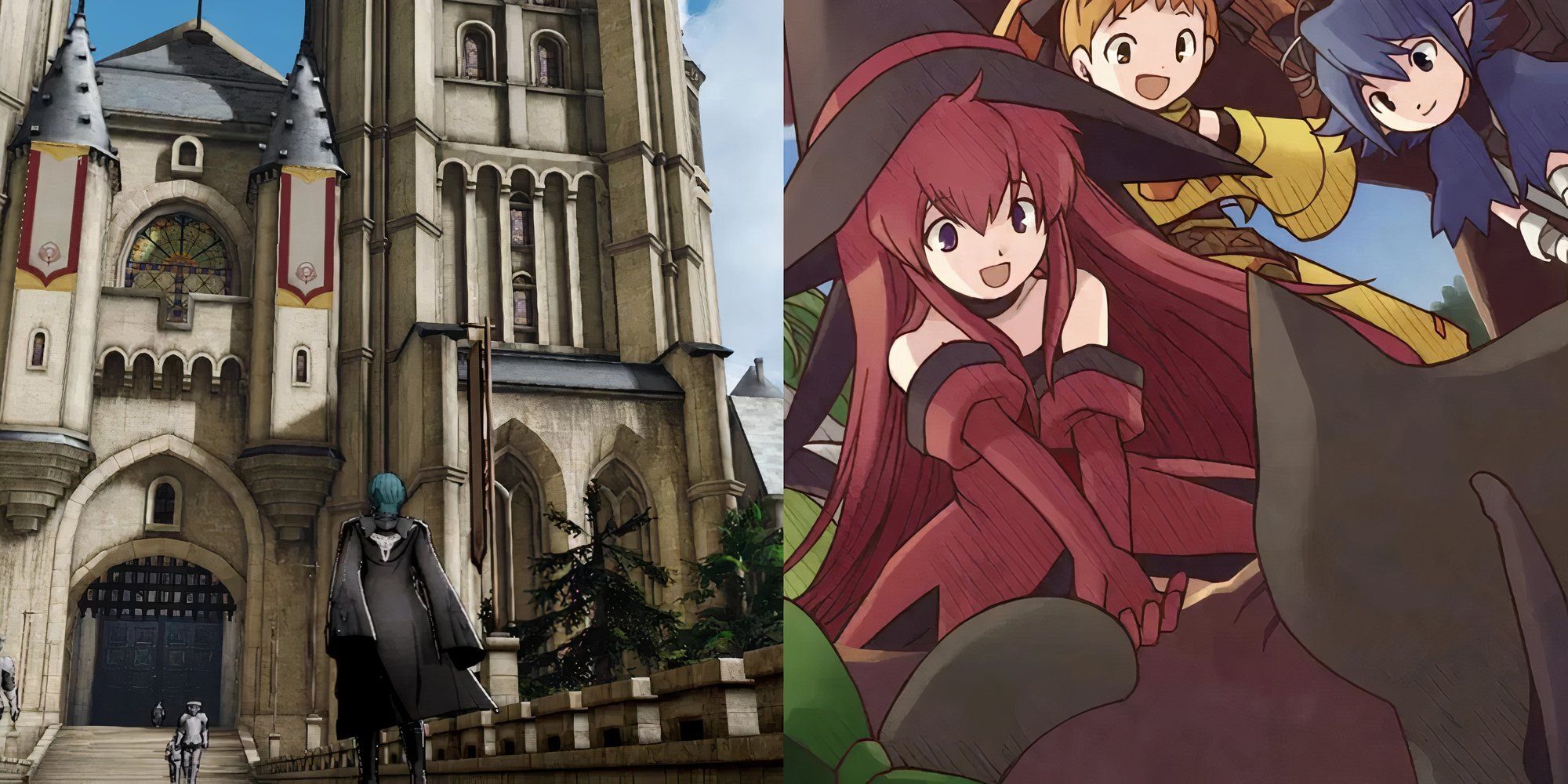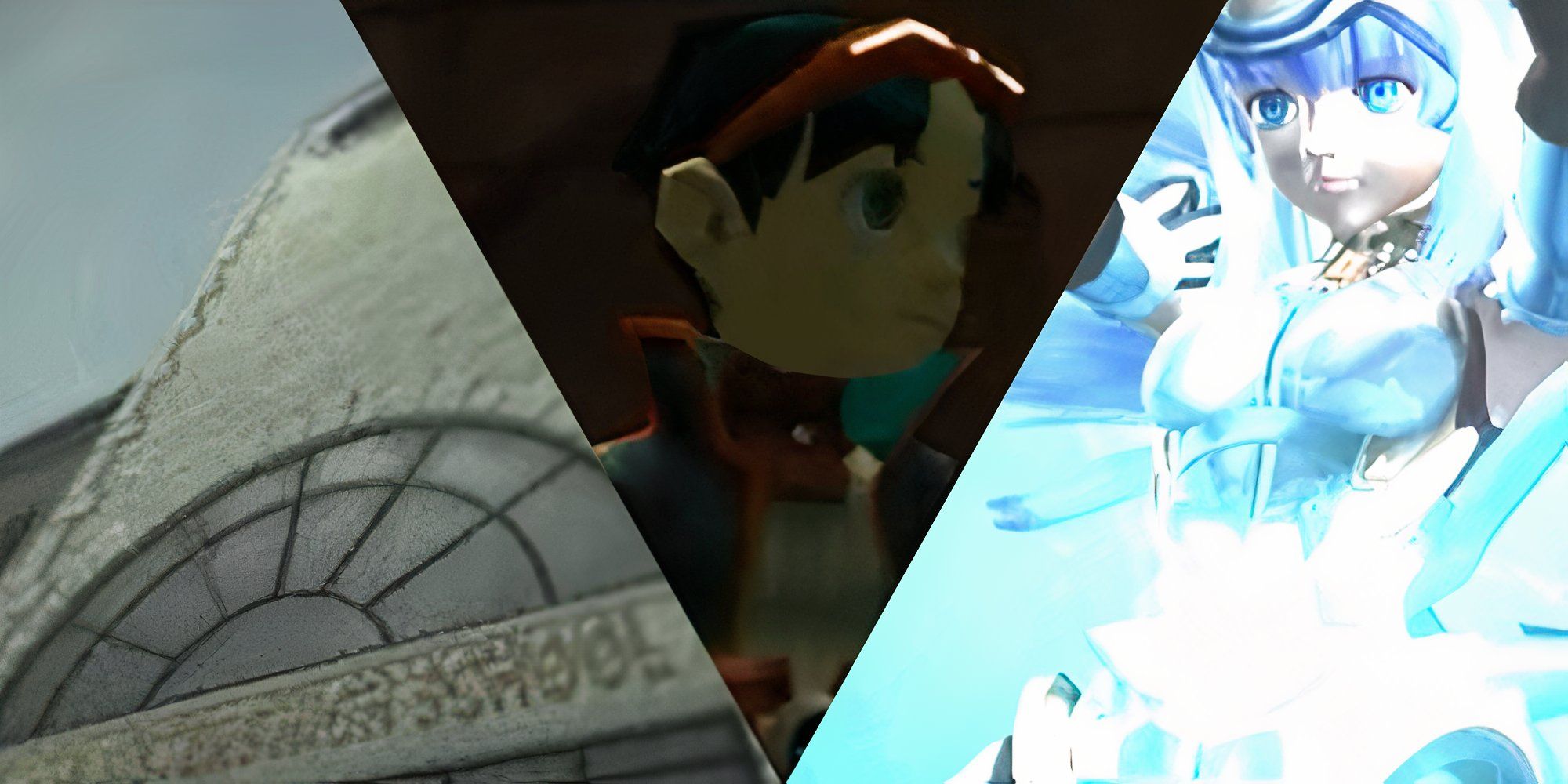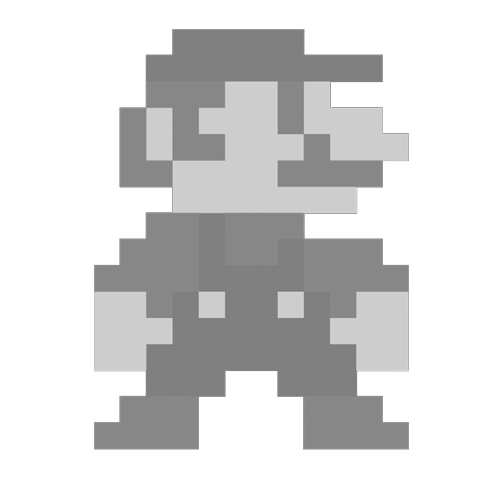Games
JRPGs With The Most Customizable Magic Systems

Key Takeaways
Table of Contents
- Different JRPGs offer diverse, customizable magic systems beyond simple leveling or purchasing spells.
- Games like
Wo Long, Elden Ring,
and
Golden Sun
provide unique ways to customize magic characters. - Systems like
Dragon’s Dogma 2
and
Suikoden 2
introduce hybrid classes and spell slots for strategic magic use.
Magic systems and JRPGs go hand in hand. There aren’t many examples in the genre that don’t feature mages or spellcasters in one form or another. As such, JRPG fans have experienced a variety of different ways of upgrading and customizing their magic in these games.
Related
5 Best JRPGs That Focus On Protecting A City
JRPGs are full of great game mechanics, stories, and characters. Here are some titles that focus on protecting a city from different threats.
Many games go with a simple system of unlocking spells as characters level up, or buying more powerful spells from merchants, but some games take these systems a step further. These games choose to give players freedom in how they build their magic characters, employing some of the most customizable magic systems in gaming.
10 Wo Long: Fallen Dynasty
Virtuous Spellcasting
- Released
- March 3, 2023
- OpenCritic Rating
- Strong
The five virtues in Wo Long: Fallen Dynasty—wood, fire, water, metal, and earth—govern a lot of gameplay elements. They dictate what stats a player will gain when they level up, what equipment players can use effectively, and what spells a player can learn. Leveling one of these virtues gives players a point to spend in that virtue’s corresponding spell tree.
Each tree has branching paths, so players are given a lot of choice and flexibility when it comes to customization. The game complicates the magic system further by having each one of the virtues be countered by another type, meaning players are encouraged to use different elements to deal with specific enemies.
9 Dragon’s Dogma 2
Hybrid Classes
- Released
- March 22, 2024
- OpenCritic Rating
- Mighty
The Dragon’s Dogma series takes an interesting approach to player classes and learning new abilities. Dragon’s Dogma 2 introduced more ways to customize the Arisen into a flexible magic wielder. The previous game’s approach of unlocking advanced classes at higher levels is replaced by players having to seek out specific masters to learn vocations and powerful skills.
The Warfarer class allows for free customization of learned abilities in other classes too, meaning that there’s almost infinite versatility for players who want to dig deep into multi-classing. The only downside is the time investment required to bring a diverse build together.
8 Elden Ring
31 Schools of Magic
- Released
- February 25, 2022
- OpenCritic Rating
- Mighty
Elden Ring goes further than any of FromSoftware’s previous games in giving players magic options for offense, defense, and support. Spells are split between incantations and sorceries, relying on either Faith or Intelligence stats respectively. Some spells also require investment in Arcane along with one of those other magic stats, too.

Related
8 Best Action JRPG Franchises, Ranked
Throwing action combat into a JRPG is a great way to make them a lot more thrilling and engaging.
There are more than 200 spells to experiment with, so whichever way players balance their stats, they’ll have a number of options to choose from. Spells can be freely swapped out at sites of grace, and respecing is more freely available in Elden Ring than in previous games, meaning it’s relatively simple for players to build around spells as they see fit.
7 The Legend Of Heroes: Trails In The Sky
Elemental Quartz
The magic system in Trails in the Sky can be difficult to come to grips with, but once players understand it, it allows for some interesting character customization. Players equip their characters with quartz, which bears a certain stat boost and an elemental affinity. As more quartz of different types are equipped, more spells can be used based on the elemental affinities of the quartz.
That means that players have to mix and match the quartz they find throughout the game to create the magic builds they want. Fortunately, the game includes a handy in-game guidebook that will show players what combinations of quartz are needed for what abilities, so they can always plan ahead.
6 Final Fantasy 9
Learn And Grow
- Released
- July 7, 2000
- OpenCritic Rating
- Strong
Final Fantasy 9‘s approach to learning magic was a little divisive, but it certainly allows players to customize each of their party’s characters with a bit of grinding. The basic premise is that characters learn spells and abilities by equipping gear, then they master that spell by gaining experience while wearing the specific gear piece. Mastering allows the character to keep the spell even after they swap equipment. Many gear pieces can be worn by multiple party members, so the only real limit to customization is how long players are willing to grind for the experience.
The game complicates this further by giving players a limited amount of AP to equip support and passive abilities, allowing players to specialize their characters even further. It’s a much more flexible and customizable version of the job system seen in earlier Final Fantasy games.
5 Suikoden 2
Spell Slots
Suikoden 2 builds on the rune system of the first game, giving players more ways to customize their magic characters. The game uses a D&D-style spell slot system for casting, giving players a certain number of casts before their characters need to rest and recharge. This guides players to the strategic and thoughtful use of the game’s powerful magic.
The more flexible rune system in Suikoden 2 allows players to have more say over how their magic characters work. Having a party with multiple high-tier magic users can bring additional benefits too, as certain high-tier spells cast at the same time can be combined into even stronger attacks.
4 Treasure Of The Rudras
Word Magic
|
Platforms |
Super Nintendo, Wii, Wii U |
|---|---|
|
Released |
April 5, 1996 |
|
Developer |
Square |
|
Genre |
JRPG, Fantasy |
Despite its relative obscurity, Treasure of the Rudras is one of the most unique JRPGs Square ever created, even by its more experimental 90s standards. From its time-jumping setting based loosely on Hindu mythology, to its magic system based on freely combining words to make spells, it takes a lot of risks.
The magic system allows for a lot of creativity. The original game based this on six combined katakana characters, but the Western SNES release translated this into a twelve-character alphabetical system. Most spells consist of an element (Ig for fire, Aqu for water) and a suffix (Na to target all enemies).

Related
6 Best JRPGs With High Replayability Based On Story Branches
JRPGs don’t often have branching stories to explore, but these games break the mold.
There are plenty of exceptions and special spells though, and players can “Enscribe” in their Grimoire freely to try and find new effects. Players can also learn combinations from books and by exploring the world, which ties the system neatly into the game’s progression.
3 Golden Sun
High Psynergy
The Golden Sun games on the Game Boy Advance had an interesting approach to customizing magic characters. Essentially, each character has an affinity with a certain element, which might seem, at first, like it limits customization. The game then expands this by letting players equip Djinn, which also have their own elemental affinities.
As the player progresses further into the game, they can equip more powerful combinations of Djinn, which in turn can hit certain elemental power thresholds, giving players access to new classes and new magic abilities, or Psynergy. It offers a lot more depth than it first appears to, and is one of the reasons why the first two Golden Sun games remain firm classics for many players.
2 Grandia
Magic Eggs
Grandia
- Released
- September 30, 1999
- Developer
- Game Arts
- Publisher
- Entertainment Software Publishing, Sony Computer Entertainment, Ubisoft, GungHo Online
Grandia took a simple system of buying new spells in exchange for Mana Eggs and expanded on it by making higher tier spells and elemental combinations only available by using the basic spells in combat to level them. This leads to a system where players can very deliberately grow a character’s skills in a certain type of magic just by using it more. This also has additional benefits, as characters gain specific stats from leveling different elemental types.
Leveling multiple types can lead to learning elemental combinations, which opens up whole new branches of magic to the player. Characters also each have their own unique spells and abilities that they can learn, which means players can build around these to customize their magic characters in many unique ways.
1 Final Fantasy 7
The Materia System
- Released
- January 31, 1997
- OpenCritic Rating
- Strong
Each Final Fantasy entry has had its own unique approach to learning new spells and customizing magic casters. Final Fantasy 7‘s materia system was highly customizable, and its deep relationship with both the gear system and the game’s story make it one of the most enjoyable magic systems in gaming.
Characters can slot materia into their weapons and accessories, which each have different numbers of open slots. This alone leads to some interesting choices in character building, but it is further developed by having linked slots in some pieces that allow for powerful support materia combinations.
Then, there’s the fact that all these weapons and armor pieces have their own stats and benefits, the fact that some pieces will boost the growth rate of materia, and more, to make each choice feel tactical and relevant throughout the game. That’s not to mention how materia is tied into the game’s lore and its characters’ stories in an interesting and organic way. It’s one of the most well-developed magic systems in any JRPG.

More
8 JRPGs That Were Ahead Of Their Time
The JRPG genre is known for its trademark style and combat systems, but these games were ahead of their time in some incredible ways.
-

 Games4 weeks ago
Games4 weeks agoXbox Game Pass Losing 7 Games Today, One of Which Is Gone Forever
-

 Games4 weeks ago
Games4 weeks agoBest Mobile Games Like Call Of Duty
-

 Games4 weeks ago
Games4 weeks agoA New One Piece Movie Might Be Coming Out Soon
-

 Games4 weeks ago
Games4 weeks agoManor Lords Reveals Upcoming Update Details
-

 Games4 weeks ago
Games4 weeks agoEpcot Announces 2025 Flower & Garden Festival Dates and Concert Lineup
-

 Games4 weeks ago
Games4 weeks agoScream 7 Casts Pitch Perfect Star Anna Camp
-

 Games4 weeks ago
Games4 weeks agoBest Planetary Romance Games
-

 Games4 weeks ago
Games4 weeks agoHelldivers 2 Releases Killzone Crossover











